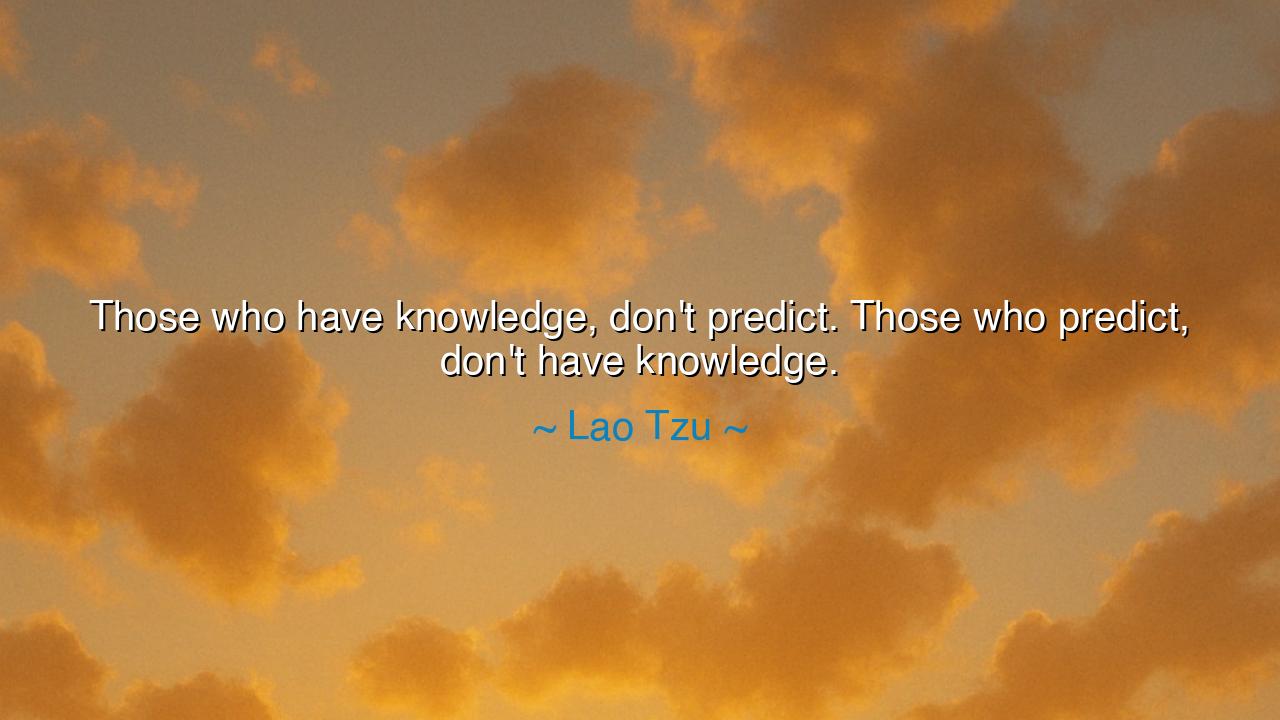
Those who have knowledge, don't predict. Those who predict, don't






Hear, O children of the Way, the words of the sage Lao Tzu, whose wisdom flowed like the eternal river: “Those who have knowledge, don’t predict. Those who predict, don’t have knowledge.” These words, simple as falling rain, conceal a depth as vast as the sea. For in them lies a teaching about the nature of truth, the limits of human foresight, and the humility required of those who seek wisdom. The wise do not boast of foretelling the future, for they know the future is a mist beyond mortal grasp. The fool, blind in ignorance, rushes to make predictions, and in his arrogance reveals his emptiness.
What is true knowledge? It is not the arrogance of certainty, nor the pride of declaring what tomorrow shall bring. True knowledge is seeing the world as it is, here and now, without illusion. The one who truly knows understands the ebb and flow of things, and so he does not bind himself with the chains of false prophecy. To see clearly is enough; to live in harmony with the present is wisdom. It is the fool who, refusing to face reality, flees into prediction, imagining himself master of time, when in truth he is a prisoner of his own ignorance.
Consider the winds and the waves. The fisherman who knows the sea does not claim, “Tomorrow the storm will strike at this hour.” Instead, he observes the sky, the smell of salt, the flight of birds, and in this present knowledge he prepares himself for whatever may come. He does not predict—he understands. But the one who boasts of foresight, saying, “I know what the heavens will decree,” is soon humbled when the storm arrives unheralded, and his nets are torn to pieces. The sea laughs at predictions, but it respects the wisdom of those who live in accord with its tides.
History bears witness to this truth. Recall the tale of the Titanic, the ship declared “unsinkable.” Men of pride predicted eternal safety for that vessel, certain their machines had conquered nature itself. Yet those who truly had knowledge of the sea, the humble sailors who feared the iceberg and respected the deep, were ignored. And in one night, human pride was shattered, and the great ship sank into darkness. Those who predicted knew nothing; those who knew did not predict.
And yet, we may look to another example, the wisdom of Sun Tzu, the general who wrote The Art of War. He did not prophesy victories; he studied the present—terrain, supply, discipline, the hearts of men. By observing what is, he could respond to what may be. His victories were not born of predicting the future but of understanding the present so profoundly that when the future arrived, he was ready. His knowledge was not a boast of foresight, but a mastery of the now.
Thus, Lao Tzu’s teaching reveals itself: prediction is the crutch of the ignorant, who seek to appear wise. But those with true vision know that life is ever-changing, a river that cannot be seized in the hand. They do not waste breath on predictions but walk with readiness, humility, and peace. Knowledge is not knowing what tomorrow will bring—it is knowing how to live when tomorrow comes.
The lesson, beloved listeners, is this: do not waste your strength in trying to chain the future with words. Instead, seek clarity in the present. Observe the world around you, learn deeply, and prepare your heart. Do not boast, “I know what will happen,” but train yourself to face whatever happens. This is the mark of the wise: calm in uncertainty, steady in storms, humble before the unknown.
And so I say to you: let your practice be this—each day, resist the urge to predict, and instead cultivate understanding. Look closely, listen deeply, reflect humbly. When desire tempts you to claim foresight, remember the sage’s words: “Those who have knowledge, don’t predict. Those who predict, don’t have knowledge.” Live this truth, and you will walk the path of wisdom, prepared for all that flows from the river of time.






AAdministratorAdministrator
Welcome, honored guests. Please leave a comment, we will respond soon